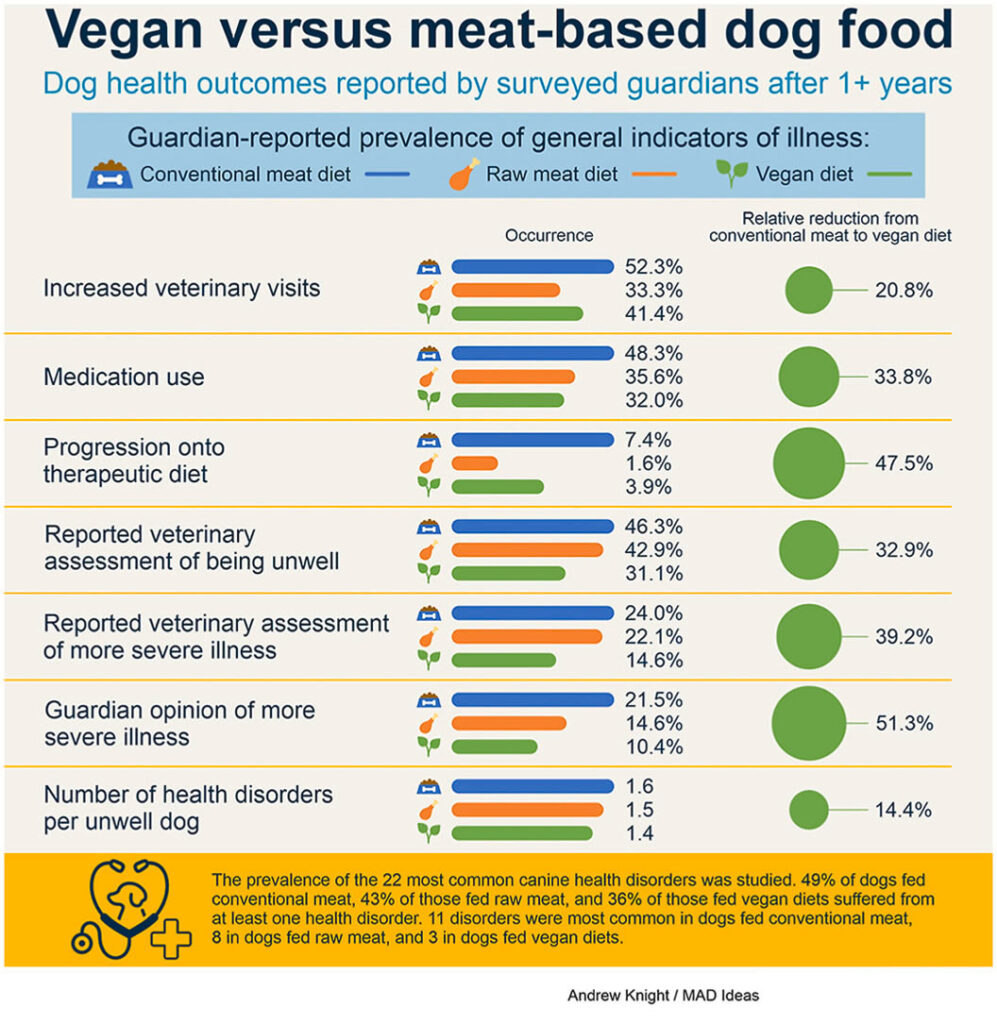In Yet More Evidence for Dogs, A Vegan Diet Outperforms Meat on Health Outcomes
4 Mins Read
New research presents the latest evidence of plant-based food’s benefits for dogs, with vegan diets presenting the best health outcomes for canines.
For dogs, vegan diets are linked with lower medication use, fewer health disorders, and less frequent visits to the vet compared to meat-heavy diets.
That’s the consensus of a new study, which found that overall, “vegan diets had the best health outcomes” for dogs. It’s the latest in a growing list of evidence that has tied plant-based canine diets to be nutritionally on par or better than meat-eating.
The researchers surveyed owners of 2,536 dogs, 54% of whom were fed conventional meat diets, 33% raw meat, and 13% vegan. “Dogs fed vegan diets clearly had the best health outcomes in this very large-scale study, and these results are consistent with prior studies in this field,” said lead author Andrew Knight, who has led a number of studies exploring veganism, pet health, and climate change.
He did caution that “care should always be taken to ensure diets are nutritionally sound, by checking package labelling and purchasing from reputable pet food companies”.
Vegan dog food better for several illness indicators

The study builds on 2022 research conducted on the same dogs, which found that among the 22 most common health disorders found in canines, 11 were most prevalent in those eating conventional meat, right in those consuming raw meat, and three in those on vegan diets. Overall, 49% and 43% of dogs fed conventional and raw meat were unwell, respectively, as opposed to 36% of those fed a plant-based diet.
But in that research, the differences in ages were large – vegan dogs were older than conventional meat-eating ones, and lower ages can improve health outcomes. This latest study added controls for age, sex, neutering status, breed size, and unusually high exercise levels, and measured them against seven illness indicators (as well as the 22 specific disorders).
“This trend was clear and consistent, with lowered odds of illness indicators usually both substantial and statistically significant, for dogs fed vegan diets,” the study notes.

The results indicated that by switching from a conventional meat diet to veganism, dogs will see a reduction of 21% in vet visits, 34% in medication use, 48% in a progression to a therapeutic diet, and 14% in the number of health disorders. Plant-based dogs are also 33% and 39% less likely to be assessed as unwell or severely ill by vets, respectively, with their guardians also 51% less likely to report severe illnesses.
Meanwhile, when compared to raw meat diets, vegan diets represent reductions of 10% in medicine use, 8% in health disorders, as well as 34% and 29% in vet and guardian reports of severe illnesses. Raw meat diets do result in 24% fewer vet visits than vegan diets, as well as a fraction of a chance of progressing onto a therapeutic diet.
That said, the study references numerous studies that have “demonstrated nutritional deficiencies or imbalances, and pathogen hazards, associated with raw meat diets” for dogs.
Alternative pet food on the rise

“For six specific disorders, vegan diets were associated with statistically significant risk reductions of 50-61% compared to dogs fed conventional meat,” the authors write.
“After pooling our results with related studies published to date, vegan dog food was consistently associated with lowered risks of multiple specific health disorders. No health disorder was consistently more prevalent in dogs fed vegan diets.”
According to Knight, this is the 11th scientific study that demonstrates good health outcomes in dogs fed vegan or vegetarian diets. It comes weeks after the British Veterinary Association (BVA) reversed its position on the health effects of a vegan diet for dogs, recognising that it’s possible to feed canines on a fully plant-based diet, as long as they’re nutritionally complete.
It followed a survey by the association, which revealed that 42% of pet owners feed their furry friends meat-free diets. Commending the BVA’s decision, Knight said at the time: “It is now up to international veterinary associations to follow suit.”
Vegan dog food is already a $13.6B market, and with awareness about the environmental impact of meat consumption increasing, this sector is poised for further growth. Pets are thought to consume 20% of all meat produced globally. In the UK, they eat more meat than the entire under-18 population.
“Nutritionally sound vegan diets offer extremely large environmental benefits, so this is very good news for dog owners who want to protect the environment whilst also maximising their dogs’ health,” Knight says of the latest study.
Alternative protein for pets is an exploding space – the UK has approved cultivated chicken for pets, companies in the US are hoping to get the greenlight by early 2025, while vegan dog food makers continue to roll out new products. And in Asia, Mars Petcare is co-leading an initiative to help human food startups develop sustainable options for pets.



